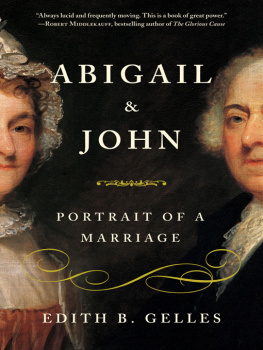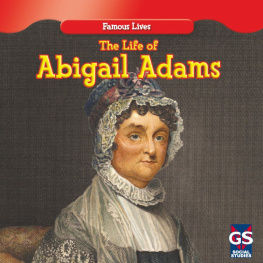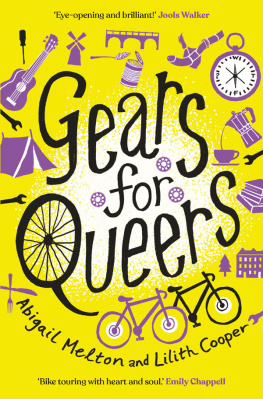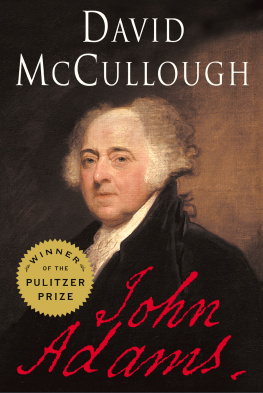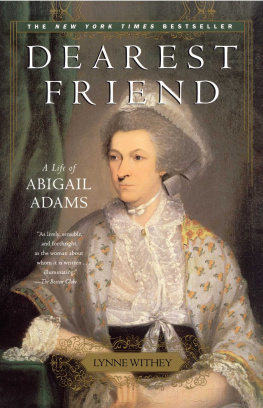Edith B. Gelles
This is the first double biography of Abigail and John Adams. While biographies of both founders have appeared in recent years, none treats the marriage of the Adamses with the balanced attention that their extraordinary relationship deserves. Biographies of John Adams extol Abigail as his wife, and most biographies of Abigail Adams do the same. Still, no one has written about Abigail and John in tandem; nor, for that matter, has any founding couple received attention in partnership. History has treated the founding of the United States as an exclusive male enterprise. One reason for this is that biographers and historians mostly focus on the political, military, and diplomatic aspects of the era. Scant attention is paid to the social world, where women primarily functioned. This double biography of Abigail and John Adams examines their remarkable marriage in the context of the revolutionary and federal periods by shifting the historical lens to their family.
This is possible because the letters of Abigail Adams, alone among the wives of the founders, have survived, hundreds of them, and Abigail could write. Her letters are artistry. She had the gift of language and she told stories. Her surviving letters are the best record that we have of a womans experience during the revolutionary era. And John Adams wrote back. John was undoubtedly the greatest literary stylist among the founders. His letters fairly tingle with passion; his personality is revealed with raw insight in a torrent of words that bring life to his world. Between them, and with wit, intelligence, and humor, the world of the founders, the men and the women, comes alive. Only by seeing the Adamses in tandem, as a couple, can we fully understand John or Abigail Adams and their lives and times.
Abigail and John Adams were married for fifty-four years, a not-uncommon occurrence in the late eighteenth century, when there existed few exit clauses to the bonds of marriage. Couples married for life. The Adamses followed the example set by their own parents and grandparents, aunts and uncles, cousins and friends. Their marriage has been mythologized in American history. Just the mention of Abigail and John calls forth an image of an ideal relationship, one founded upon love, loyalty, friendship, and courage, which it was.
Their union appears modern because it possessed many of the attributes of a successful marriage as we think of it today. It was a love match that endured. It produced a famous son and established a dynasty of great citizens. It overcame adversity intact. Most important, it was a marriage of equals. Abigails intelligence, wisdom, and strength flourished alongside that of her husband, lending credibility to her more equal status. That happened because of both their characters. Both of them required parity in a life partner. Abigail developed into an erudite woman, because of her own ambitions and talents, but also because John needed a wife he could talk to. John became the leading lawyer, statesman, and diplomat that he did because Abigail, if she didnt always encourage him, never prevented his involvement, whatever the cost to his family.
Still, there should be no misunderstanding that the Adamses did not experience a typical eighteenth-century marriage, for they did. They lived in a culture that survived from the earliest Puritan settlers of Massachusetts. Each of them represented a different strain of that New England background. Abigail Smiths forebears were famous Puritan clerics and later politicians and merchants. John Adams came from the class of yeoman farmers and skilled artisans that populated the early settlements. Both of them grew up in religious communities that left no doubt in their minds about the questions of good and bad or right and wrong. Abigail, more than John, attributed all of her experiences to Providence and therefore accepted adversity as a given in life. John was governed by his compulsion to make a better world rather than to accept what existed. Religion, in the end, was a fundamental force in both their lives.
It was the religion of their New England Puritan forebears, refined into a secular way of life by the end of the eighteenth century, that explains their concept of marriage as well as their patriotism. Fundamental to their behavior was duty, which to them meant service. The purpose of life was to serve, to perform acts of virtue and generosity, to sacrifice for the community and for the improvement of the world.
Their eighteenth-century concept of marriage also required the performance of duty in their different departments, as Abigail told it, the man in the public world and the woman within the domestic world. Because of the Revolution, Abigail and John had to reassess their traditional marriage; they renegotiated the terms of their covenant. Abigail always believed that Johns service to his nationthe performance of his worldly duty, the sacrifice of their years together that both of them madewas synonymous with the success of the Revolution. John never questioned whether that was the case.
So, while the marriage of Abigail and John Adams appears modern in many respects, it can best be understood in the context of their early Massachusetts background, against the world of Puritan New England where they grew up and lived. They represented a transitional era in the history of marriage just as they participated in the revolution that separated America from its colonial past into its modernist present. Abigail Smith Adams and John Adams were unique individuals. They loved each other; they enjoyed each others company; they relied upon each other even when apart; they trusted each other and were loyal. When asked at the end of their lives what had been the hardest experience of their long years, both separately replied that it was living apart for so many years. For people who believed in sacrifice as a way of life, theirs was the ultimate performance of duty as mandated by their Puritan past.
WHEN ABIGAIL SMITH DECIDED TO MARRY JOHN ADAMS IN 1764, she made the most fateful decision of her life. As a young eighteenth-century woman, she knew that marriage was her destiny and her only latitude was the selection of a mate. She needed to choose well. Her parents opinions carried weight, but they were not conclusive. Her relatives and community might have thoughts, but in the end it would be her own sound judgment and feelings that were the determining factors. She would measure his character and test his affections and hope that her perceptions were accurate. He was educated, appeared honest and sober, was very industrious, and had high ambitions, so finally, after more than three years of courtship, she judged that John had met her standards. He certainly had won her heart.
When John Adams chose to marry Abigail Smith, he made the most fortuitous decision of his life. A twenty-nine-year-old man, he had already made several choices that would shape his future. As the eldest son in his family, he had fulfilled his parents wishes and graduated from Harvard. However, going against their expectations, he rejected the life of a clergyman and settled instead upon the law as a profession. When he chose Abigail as his lifes companion, he took yet another important step. She was attractive, came from a highly respectable family, and had youthful energy. Moreover, her greatest assets would be her steadiness of temperament, her intelligence, and her great sympathy for his ambitions. He believed that his destiny could be fulfilled with Abigail as his companion.

